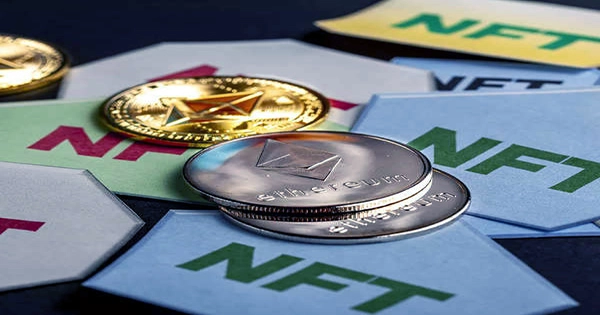The NFT market is a part of the crypto ecosystem that has grown at a breakneck pace in the last year. However, as sales have dropped in recent months, blue-chip NFT investors are seeking for new ways to grow. According to statistics from NFT data aggregator CryptoSlam, worldwide NFT sales volume peaked at $4.6 billion in January but dropped nearly 50% to $2.4 billion by the end of March.
According to the founder of Burnt Finance, who goes by the nickname Burnt Banksy, weak projects with loosely connected communities are largely to blame for the fall in total NFT sales. Despite the fact that total NFT sales are down, blue-chip NFT projects such as Bored Ape Yacht Club (BAYC), Mutant Ape Yacht Club (MAYC), and Azuki have climbed by 169 percent, 199.6 percent, and roughly 146 percent in the last 30 days, according to CryptoSlam statistics.
While some NFT owners are selling their digital objects, Banksy claims that others have “strong convictions” in their NFTs and wish to keep them. As a result, NFT lending has increased because owners want to use them as assets to get liquidity and, in turn, produce higher income elsewhere or buy more assets, he explained. On decentralized lending, the NFT loan volume According to statistics from Dune Analytics user gideontay, NFT marketplaces Arcade and NFTfi gained 171 percent from $30.63 million in Q4 2021 to $83.17 million in Q1 2022.
According to Stephen Young, CEO of NFTfi, “the majority of the loan industry is centered on the established high-value NFT collections.” “While overall NFT sales are down, the top-tier projects are still worth a lot of money.” People are lending their NFTs to acquire liquidity and optimize their own capital efficiency, just as they would any other asset, according to Marco Manoppo, research director at Digital Asset Research.
“This may be done through well-known crypto brokerages like Genesis or through decentralized applications that are attempting to promote NFT lending using smart contracts while adhering to a set of guidelines to mitigate liquidation risks,” he explained. Arcade specializes in allowing NFT users to acquire a loan by pledging their digital memorabilia as collateral, rather than having to put up a house or car as security.
According to Gabe Frank, CEO and co-founder of Arcade, the company’s platform has around $17 million in loan volumes and more than $25 million in blue-chip NFTs held in escrow. “It’s because there’s greater knowledge and education about what individuals can do with their NFTs that there’s a pause in primary sales for NFTs and lending is going up,” Frank explained.















